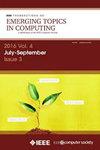公共卫生政策依从性评估的众包驱动AI模型设计框架
IF 5.4
2区 计算机科学
Q1 COMPUTER SCIENCE, INFORMATION SYSTEMS
IEEE Transactions on Emerging Topics in Computing
Pub Date : 2024-11-18
DOI:10.1109/TETC.2024.3496835
引用次数: 0
摘要
本文重点研究了一种公共卫生政策依从性评估(PHPA)应用程序,该应用程序旨在利用来自社交媒体的大量公共卫生政策依从性图像数据,自动评估人们在紧急全球卫生危机事件(例如COVID-19,猴痘)中的公共卫生政策依从性。特别地,我们研究了PHPA应用中的最优AI模型设计问题,其目标是在不需要人工智能专家的情况下,利用众包人工智能来准确识别最优AI模型设计(即网络架构和超参数配置组合)。然而,在我们的问题中存在两个关键挑战:1)考虑到网络架构和超参数配置之间的相互依赖性,如何有效地优化人工智能模型设计是一个挑战;2)在PHPA应用中,利用从普通人群工作者那里查询到的人类智能来识别最优的AI模型设计是非常重要的。为了应对这些挑战,我们开发了CrowdDesign,这是一个主观逻辑驱动的人类-人工智能协作学习框架,探索人工智能和人类智能的互补优势,共同确定PHPA应用中人工智能模型的最佳网络架构和超参数配置。来自两个实际PHPA应用程序的实验结果表明,通过实现最佳的PHPA性能,CrowdDesign始终优于最先进的基线方法。本文章由计算机程序翻译,如有差异,请以英文原文为准。
A Crowdsourcing-Driven AI Model Design Framework to Public Health Policy-Adherence Assessment
This paper focuses on a public health policy-adherence assessment (PHPA) application that aims to automatically assess people's public health policy adherence during emergent global health crisis events (e.g., COVID-19, MonkeyPox) by leveraging massive public health policy adherence imagery data from the social media. In particular, we study an optimal AI model design problem in the PHPA application, where the goal is to leverage the crowdsourced human intelligence to accurately identify the optimal AI model design (i.e., network architecture and hyperparameter configuration combination) without the need of AI experts. However, two critical challenges exist in our problem: 1) it is challenging to effectively optimize the AI model design given the interdependence between network architecture and hyperparameter configuration; 2) it is non-trivial to leverage the human intelligence queried from ordinary crowd workers to identify the optimal AI model design in the PHPA application. To address these challenges, we develop CrowdDesign, a subjective logic-driven human-AI collaborative learning framework that explores the complementary strength of AI and human intelligence to jointly identify the optimal network architecture and hyperparameter configuration of an AI model in the PHPA application. The experimental results from two real-world PHPA applications demonstrate that CrowdDesign consistently outperforms the state-of-the-art baseline methods by achieving the best PHPA performance.
求助全文
通过发布文献求助,成功后即可免费获取论文全文。
去求助
来源期刊

IEEE Transactions on Emerging Topics in Computing
Computer Science-Computer Science (miscellaneous)
CiteScore
12.10
自引率
5.10%
发文量
113
期刊介绍:
IEEE Transactions on Emerging Topics in Computing publishes papers on emerging aspects of computer science, computing technology, and computing applications not currently covered by other IEEE Computer Society Transactions. Some examples of emerging topics in computing include: IT for Green, Synthetic and organic computing structures and systems, Advanced analytics, Social/occupational computing, Location-based/client computer systems, Morphic computer design, Electronic game systems, & Health-care IT.
 求助内容:
求助内容: 应助结果提醒方式:
应助结果提醒方式:


